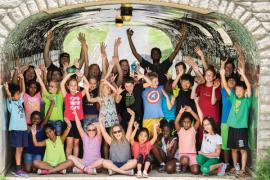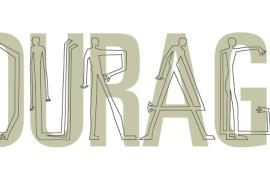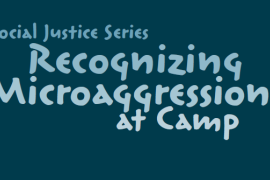| Social Justice This roundtable is part of Camping Magazine's series on social justice, exploring social issues in the context of individual camps and the camp community as a whole as a way to spark further conversation and inspire positive change. Contact Ann Gillard (anngillard@gmail.com) if you would like to participate or contribute to this series. |
How do camps incorporate social justice into their programming for campers? Five passionate, experienced, and insightful camp administrators took their time to share their camps' approaches to this topic. Responses have been edited for space, so please visit the camps' websites for more information.
Mary Dinski, program and camp director at Fiver Children's Foundation, New York, New York
Nikki Bryant, director of summer camps and youth programs, Hidden Villa, Los Altos Hills, California
Amanda Jonikaitis, assistant director, Camp Kupugani, Leaf River, Illinois
Yatiel Owens, MSW, director, Camp Winnarainbow, Laytonville, California
Nora Kramer, founder and executive director, Youth Empowered Action (YEA) Camp, High Falls, New York
Why is it important for your campers to learn about or practice social justice?
Dinski: It's important because the population with whom we work is both marginalized and minority. Campers come from a socioeconomically disadvantaged background and are constantly confronted with injustices in their neighborhoods or schools, or just in life. This can create barriers and cause a lot of problems in their lives and affect where they're going to go.
Kramer: While we have seen many advances in social justice as well as glaring inequities — from police brutality to climate change, animal cruelty to poverty — most schools do not teach about the causes and solutions to these most important issues.
Owens: The time is now. [This year is the] 50th anniversary of Martin Luther King standing on the stage and saying, "I Have a Dream." If we look back on the past 50 years, there's been some change and we're in a different spot, but still we're not all equal. Our kids aren't our future; our kids are right now. They're our leaders right now. They have a voice. They're super powerful and can make change.
Bryant: Youth see social injustices, but they don't always have tools or words to label what they are experiencing. Jonikaitis: There are very important issues arising that cause certain emotions and reactions within people, and kids are in their prime of developing and formulating their own opinions. The conversations surrounding diversity and conflict resolution are not conversations typically or easily had between young children, and our focus is to give children tools to openly communicate with one another, cross boundaries, and put themselves in the shoes of others.
Kramer: Learning about social justice is perhaps the best way to learn about our humanity, its greatest accomplishments and failures, and the greatest needs and challenges of our society. It taps into our natural human inclination toward empathy and brings people together in a shared commitment to equality. It is also key to not perpetuating injustices. Finally, it is extremely empowering to understand the world around you — the good, the bad, and the ugly — and to know ways to impact it.
Does engaging in this work relate to your camps' mission and/or history?
Bryant: Our program has a very strong history in social justice. In 1945, our founders thought "if children were accustomed to one another from cradle to the grave from different cultures, they could probably grow past the intolerance the adults were struggling with." As stewards of a legacy that has been passed down, we continue to do that.
Owens: It's woven into every single system from hiring to how we structure building our community of kids and staff. Thirty-one years ago our first scholarships were put into place. We wanted to make sure that every kid could come so we could see we're all just people. This camp has been a 41-year social experiment and grassroots movement.
What formal activities do you do with campers that promote social justice?
Jonikaitis: Social justice-related activities are experiential, interactive, and camper-focused. These activities give campers a platform for an issue and a safe space to express their thoughts and how we can work together to make some sort of change if they feel that is necessary.
Kramer: For example, "Planetary Problem Puzzle" is an activity that allows campers to examine the interconnection of different problems in our world. It might seem like issues as diverse as poverty, war, racism, and the environment have nothing to do with each other, but of course they are extremely interconnected. We put campers in small groups and ask them to think about how different social issues such as these relate to each other. We reconnect as a large group in a circle with a ball of yarn and have campers choose one issue to connect with another, throwing the ball of yarn to demonstrate the web of interconnection between issues.
Bryant: We like to get them up and moving, talking and doing skits — participating in experiential activities so that learning is fun as well. For example, when teaching about race and class, we have a breakfast to better understand unequal distribution of food and wealth. One table has a full breakfast and a different table has cereal. Campers look around and wonder why that table gets all this amazing food but their table has only cereal. After, we have a conversation to discuss what that's like, how it feels, and where that exists in the rest of our society.
Dinski: We let kids come up with what they want to change in their direct communities. For younger campers we ask: "In what ways are you responsible to your school or camp community? How do you better your community by your actions and words? How do you stand up for yourself and others?" For the Teen Adventure Program, over two years there are several curriculum pieces: gender box, gender walk, power dynamics and privilege, internalized oppression, stereotypes and isms, gentrification, food justice.
Bryant: Teaching social justice to four- to six-year-olds is different than 15-year-olds. The human condition has a natural tendency to break people into groups. We need to recognize what that's like at each developmental stage, which is fluid. Skills learned early on help kids be more critically minded about injustice they learn about later on. For example, in working with young children about sharing, they learn to be more thoughtful when their friend is not sharing and perhaps intervene. Ask yourself, "What is the developmental skill children need to learn to be more critically minded when they're older and they perceive or experience injustices on their own?"
Does social justice programming connect to existing curriculum about character education or youth development?
Dinski: The beginning of social justice education for our younger campers is about how to be a community builder and what issues may be a source of frustration in their community. Kids identify changes they want to make, such as about crime, drugs, police, etc. Older campers spend more time engaging in specific workshops on social justice topics. This is all part of our Whole Self Curriculum.
Jonikaitis: Every summer includes Diversity and Conflict Resolution with Leadership Skills, Creativity/Self-Expression, Social Activism/Awareness, Body Image/Self-Esteem, Healthy Relationship Building, and Economic Literacy as counterparts.
Owens: We present themes. For example, this year's running theme was Freedom and Safety. Campers help shape what the camp performances will be. Through activities such as songwriting, juggling, clowning, aerials, theater, drumming, dance, beat boxing, acrobatics, unicycle, and more, we explore the narratives of our kids' lives and our world.
Kramer: We are a social justice leadership program, so almost everything we do promotes social justice in some way. The whole second part of our camp is devoted to building skills to make a difference, like starting a school club, fundraising, grassroots outreach, media, effective communication, and more. By the end of camp, everyone creates an action plan to make a difference when they get home.
Owens: We have All Nations Day — a day-long special program to create a story arc. The staff play different characters and there's something centered on a theme the kids are learning or doing. The kids go into the story and bring their own viewpoint and voice, and camp is transformed into whatever setting we create.
What informal activities, traditions, or other things do you do that promote social justice for campers?
Jonikaitis: We have a few redirections that we implement throughout camp that promote more of an inclusive environment and are more focused on self-awareness. A typical greeting for when acknowledging a group is "hey guys," and at camp we always respond with "go ladies" when there are females present.
Bryant: At our closing campfire, we sing songs that celebrate the times they had together, wishes for camp and for the world to be a community like what is created at Hidden Villa, so they take home this thoughtful, rich, diverse community to the rest of their lives and their world.
Owens: We don't label it as social justice. We label it as "How are we going to change the world? What do we stand for?" We're a community and will learn and take what we learn here and go out into the world.
Kramer: Our food is another way we show our commitment to social justice. All of the food at camp is vegan, and as much as possible is local, organic, and fair-trade. Our food choices are a primary way we impact our planet, animals, workers, and social justice on many levels, and we use our time at camp as an opportunity to practice eating more sustainability and humanely.
How do you ensure that diversity in your camp community is expected and nurtured?
Bryant: If you talk about privilege in a homogenous group, it has a different impact than in a diverse group. We set aside 50 percent of residential camp spaces for campers who come on scholarship to ensure there is a diverse group of individuals to participate together. Once you have those campers together, you have the opportunity to build a bridge with someone you would never otherwise meet in your life.
Owens: Staff pay close attention to how to build community within each tipi and camp in general so kids gain skills and recognize that not every kid comes from the same culture and understanding of the world. We make sure we're present, create safe space, and help kids connect and relate to one another. We explore and practice the very key skill of cultural humility, which is about introspection, co-learning, and recognizing/ diminishing dynamics of power. This is how we nurture and honor our diversity and invite conversations about privilege, inequality, and what is alive for the kids and staff in their world experience.
Kramer: Like most schools and camps, we have an honor code for behavior, though we make clear to our campers that this is not just lip service and we take it much more seriously than they are accustomed to. One item in our honor code is to "help make camp great for everyone." The honor code check-in is the key way we address behavior issues that usually reveal themselves within the first couple days.
In recognition of the complexity of gender, which is not expressed easily in our standard boys/girls binary of cabin housing, we house campers by their gender identity — the cabin they feel most comfortable in — versus what their birth certificate may say. Results of these kinds of practices often relate to developmentally positive experiences, such as speaking to new people and being open to others.
What results have you seen in your campers?
Dinski: Public speaking is one of the biggest impacts — speaking confidently to people. At age 17 to 18, they're confident in who they are; they've reached a place where they accept themselves, have belief in themselves, and have a support network if they're up against something. A lot of our kids have talked about going to college and struggling because they're going to predominantly white schools. Some of them deal with it by finding groups to feel comfortable in. It's the resilience, being able to educate and call out has helped them in college settings and to find a voice there.
Jonikaitis: Most campers also mention a higher comfort level with expressing their opinions and in their ability to communicate that to their peers.
Bryant: It helps their education and critical thought as they grow into young adults.
Owens: One of our founders, Jahanara, says, "This is a 41-year grassroots experiment on offering a safe space where we learn from people we would never normally meet or be friends with in order to grow cords of empathy."
Kramer: Our campers go on to make huge impacts on their schools and communities. Twelve-year-old Megan started a school club called Helping Hands for the Homeless that raised more than $2,000 for homeless people in Boston. Fifteen-year-old Ana in San Diego organized a voter registration drive to register the staff and students newly of age to vote. Sixteen-year-old Leah led her school club's successful effort to implement Meatless Mondays throughout her entire Connecticut school district.
Jonikaitis: Many of our campers (and parents) indicate a better understanding and an openness to those of different cultures through our end of session surveys.
Dinski: We have a 16-year-old boy who has been with us for eight years. He said, "I used to really not like gay people and didn't want to be around them at all. But because of Fiver I'm okay with being around gay people now. I realize they're not all interested in me." I think [decreased] homophobia is the biggest change we recognize — they're more accepting and open. Kids at a young age will come out to their cabins after they've been with them for four or five years, so when it's a group of 12-year-old boys, the kids are really accepting, like, "Well, he's part of our family. This is who he is." In the city, that might not be the case.
Bryant: Many campers do social justice-minded work in their lives. Campers become counselors who go to college and do feminist studies or learn about power and oppression. They choose to continue the education that they started as a kid to change the world through their education and their career; then they come back and share at camp. It becomes a way of life.
Any final advice?
Bryant: Don't be afraid of the content, and don't water it down because you're afraid to upset somebody. If you don't understand why teaching social justice is a sensitive issue, you should reevaluate why you're doing it. Have something in your materials that this is part of your programming to communicate to parents so it's their choice to participate. Do it with care, be intentional about what the program is for, and make sure your publications reflect that.
Owens: Conversation is what's important. There's not one answer for all camps. Have a commitment to inclusion and voice. Consciously seek and support diversity. Recognize privilege. Be willing to be uncomfortable and to take what you think you know and set it aside while learning from those in front of you. And remember to always eat, laugh, play, and create together!
The Social Justice Commitment
Commitment to social justice is threaded through the practices of these five camps and guides their programming decisions and efforts. The ways social justice is "done" at each camp is entwined with their camp-specific cultures and missions. Guided by concern for campers who confront social inequities and a desire for a better world, these camps put into place both structured and unstructured opportunities for campers to raise their awareness of themselves and others. Of course, these opportunities are age appropriate and camper-centered so the most impactful learning can happen. And the results? All good! This shows that social justice programming can be integrated into camp in ways that promote both positive youth development and a deeper connection to humanity.
|
Action Steps
|
Photos courtesy of Park Slope Day Camp, Brooklyn, New York.




